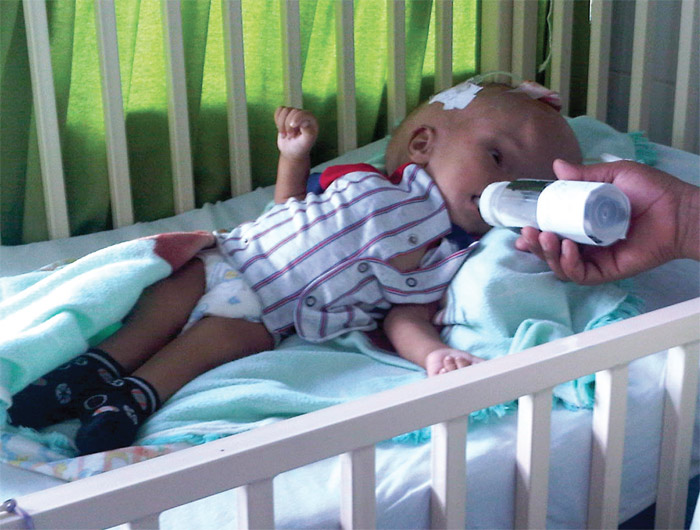Since its inception in 2009, charity organization Sun Life Foundation has saved over 400 babies.

A child born with hydrocephalus gets a second lease of life thanks to SLF. PHOTO COURTESY OF SUN LIFE FOUNDATION.
When friends brought Troy Marshall to a run-down hospital in Honduras in 2009, he could not walk away from what he saw—babies with grotesquely swollen heads, suffering from
hydrocephalus.
“When I saw the magnitude of the problem—I’m not going to lie—it overwhelmed me,” said Marshall, today the international liaison office for the Foundation. “When we visited that place, it was falling apart literally.”
Hydrocephalus is a congenital condition in which fluid accumulates in the brain, leading to the progressive enlargement of the head as well as certain death in less than two months if left untreated.
It seemed too large a problem to deal with. “But for some reason, we had faith for this. We only had USD800 in our ministry accounts, and we didn’t even have money to meet our payroll. So we bought eight shunts (small devices to drain fluid from the brain),” explained Marshall, also an ordained minister.
It was a small start, but it was a start. When he spoke to Sun Ho, co-founder of City Harvest Church, she immediately agreed to help by purchasing shunts in bulk. Given her persona as a pop artist at the time, her involvement attracted a considerable amount of media coverage in a tough political climate. “There were no foreign dignitaries coming, no one coming. It was a boost to them that people still believed enough to help,” says Marshall.
And that was how Sun Life Foundation was birthed. To date, the foundation has saved 438 lives, and now its impact extends to prevention beyond cure.
One big breakthrough was a 30-second Public Service Announcement produced by Sun Life screened in cinemas in Honduras before movies. It educates the public on proper prenatal nutrition, especially the consumption of green leafy vegetables for folic acid, the lack of which is the chief cause of hydrocephalus.
“That PSA alone has helped to lower the rate of hydrocephalus cases significantly. Before we started Sun Life, hydrocephalus affected one in every four births in Honduras.” This number has approximately been halved. At the moment, 100 to 120 shunt operations are conducted per year.
“God wasn’t just going to miraculously start saving kids. We had to do what we knew to do. The rest of it that lies between us and the breakthrough we need, that is the margin of miracles,” explains Marshall, who travels to organizations such as churches, private foundations and corporate institutions to raise funds, recruit donors and increase awareness in his role as SLF’s international liaison officer.
And miracles there have been plenty, with partnerships and donations secured one by one. High quality shunts are now obtained at discounted prices and charities have donated much-needed necessities.
“Now, every single baby born in the hospital goes home with a brand new blanket, sanitary wipes and vitamin drops,” said Marshall, explaining that it is a far cry from four years ago when mothers would swaddle their babies in newspaper because there were no blankets.
About two months ago, SLF was entrusted by the government with the management and operation of the neo-natal ward of the hospital it works with. This brings improvement, particularly in training and staffing of healthcare providers. “Because our doctors and staff are well-educated, the failure rate (which mostly stems from incorrect insertion of shunts or defective shunts) has dropped from 60 percent to 20.”
As SLF continues to do what it does, hydrocephalus may just well be a thing of the past one day.
